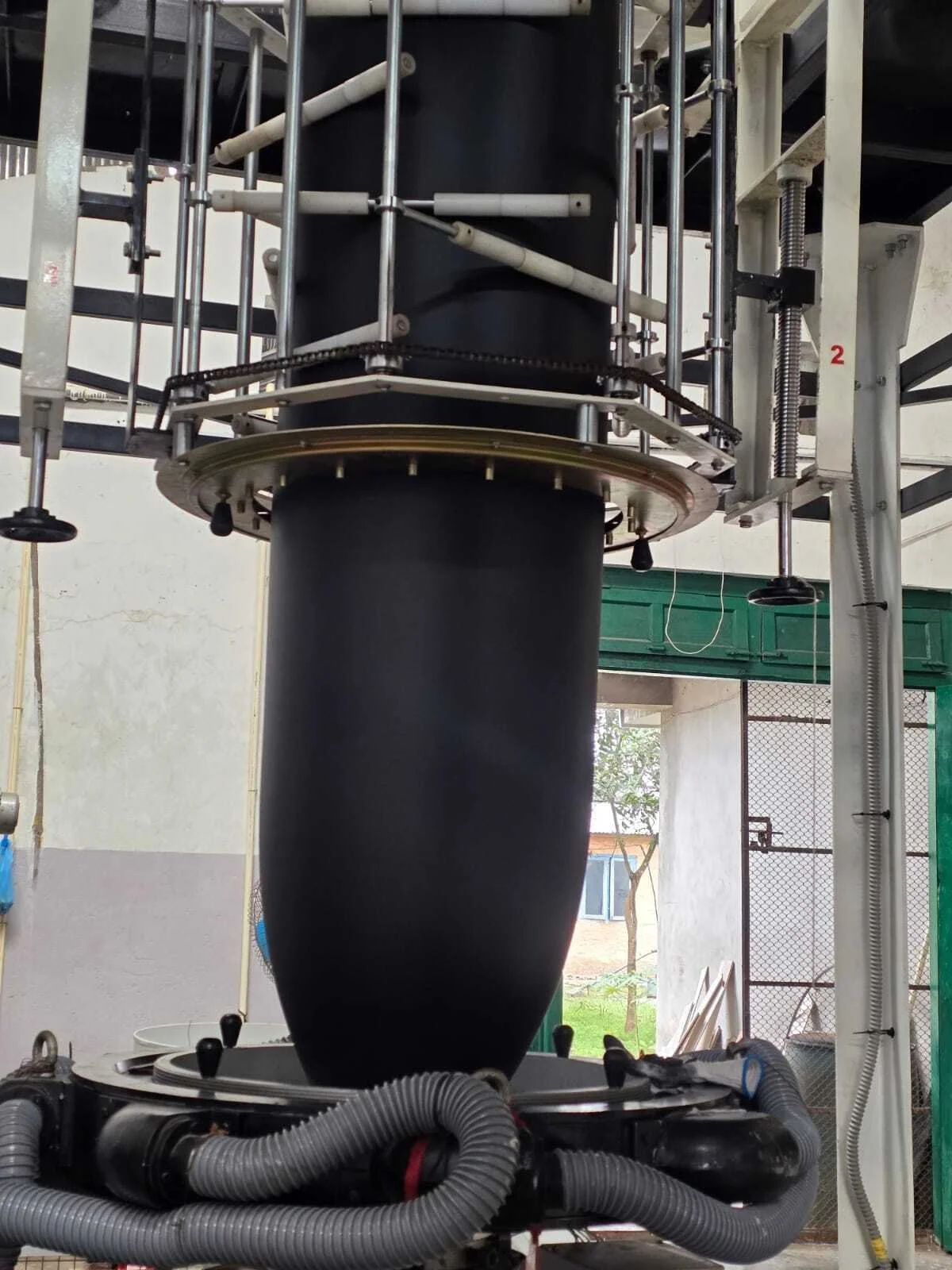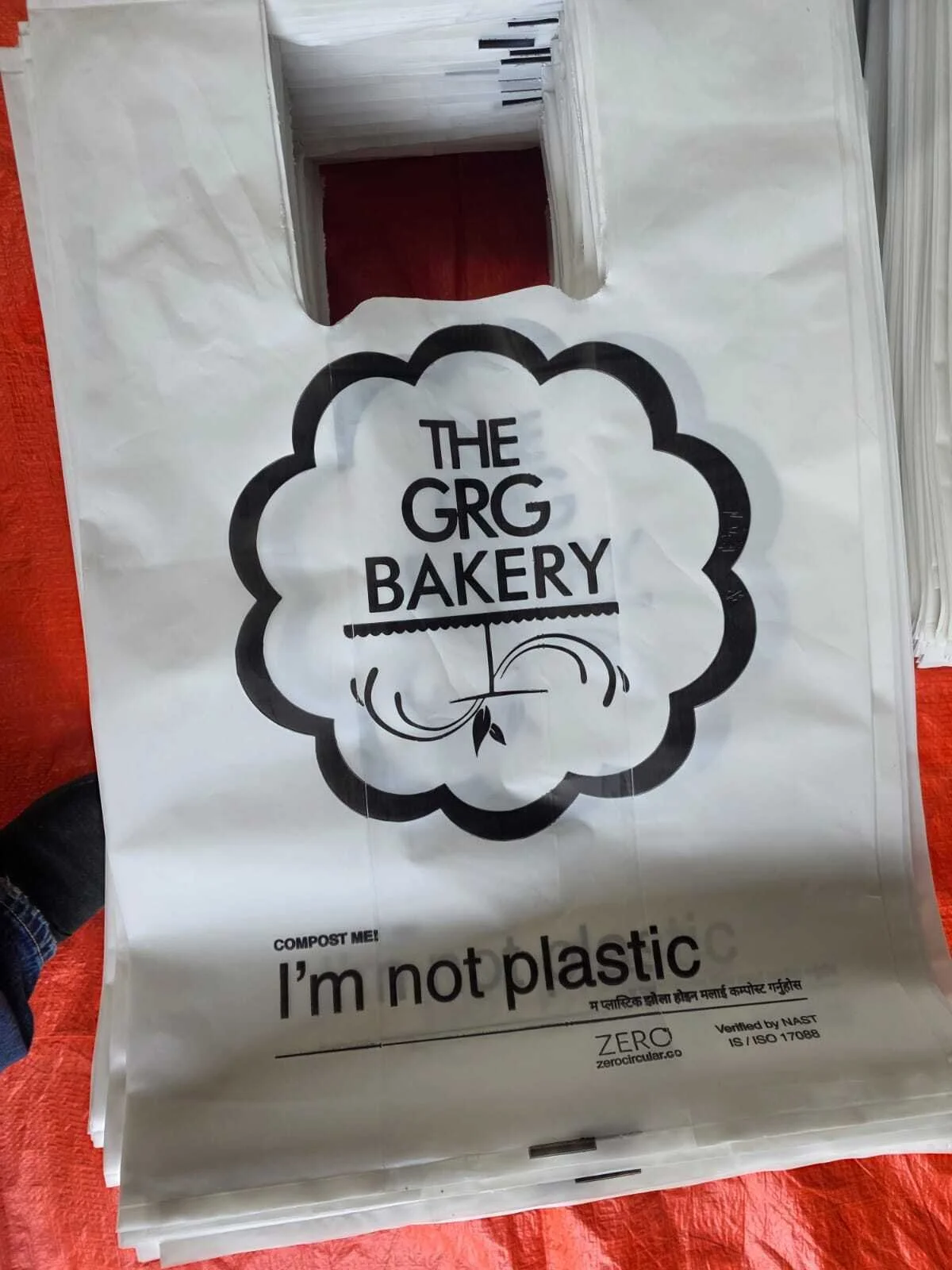Bioplastic future: using bioplastics to transform domestic plastic production
THE QUESTION
Can conventional plastic production facilities be retrofitted to produce bioplastics?
LOCATION: Nepal
SECTOR: Circular Economy, Manufacturing
TECH: Clean tech
TIMELINE: September 2023 - July 2025
PIONEER: Ugan Manandhar
PARTNERS: Utopia
The Challenge
Single use plastics are deeply embedded in our societies and are a major factor of pollution. In Kathmandu, Nepal, 4.8 million plastic bags are consumed daily, making up 15% of the Kathmandu valley’s total waste stream that ends up in open air landfill, rivers or being burned. The Himalayas are the water tower of the region and Nepal’s discarded plastics end up polluting water sources in the Bay of Bengal. Each bag takes up to 500 years to fully biodegrade, and in the process, pollutes soil and water through leachate, microplastic release and air pollution through burning, all that in addition to the carbon impact of its sourcing, production, transportation and consumption.
Recognising the scale of the problem, in 2019 the Government of Nepal legally banned the use of plastic bags and other single-use plastic items (e.g. straws, cups, and plates). However, there has been no enforcement of the ban and consistent demand from users due to no suitable alternative. Until now…
The Idea
Starting in 2023, the Frontier Tech Hub has been working with Zero Circular, a bioplastics innovator, and Utopia Kathmandu, a social enterprise startup incubator to explore the production of bioplastics in Nepal. The pilot focused on two key areas:
- Retrofitting of existing manufacturing machines
- Commercial viability and proof of business
There is an acute need to replace harmful, carbon-intensive plastics with a bio-based, compostable product that has similar characteristics and functions – i.e. strength, water tightness, transparency, thickness, size. Retrofitting was identified as a method of upgrading older, small/medium-scale plastic production machines, which make up the bulk of Nepal’s plastics production capacity. We tested retrofitting sensors and parts to older production equipment to enable the production of bioplastics, which requires machines capable of more consistent and precise heat and processing. The pilot found, through three rounds of experimentation, that while technically feasible, retrofitting might not be the viable commercial business model first envisioned as it took longer, was more costly and complex than first anticipated.
Compostable bioplastics are a new concept in Nepal. This pilot sought to identify, test and create a strong bioplastics awareness in the plastics marketplace. The team engaged with potential customers through fake-door advertising campaign to gauge interest and level of demand. The team also started co-creating use cases with highly motivated customers and end users developing a clear understanding of the market through this experimentation and further direct market research. Niche products and customers were identified and served through limited bioplastics production, but this indicated that real change would stem from securing price parity. Zero Circular themselves identified significant opportunities to lead the bioplastics market.
The pilot-level learning from this project helped to develop a clear business plan for investment into production backed by the FT Hub’s follow-on fund. This investment will set up Zero Circular with a high-capacity production facility to enable them to meet the demand they already identified and to bring down the price of bioplastics in the Nepal market. This has already led to three skilled green manufacturing jobs created, with more planned as production ramps up across 2025 and beyond.
What Happened
The pilot set out to test whether Nepal’s existing plastics manufacturing base could transition to bioplastics, while simultaneously building early market demand and visibility for biodegradable alternatives. Starting in August 2023, the pilot team focused on three core questions: can conventional plastic machinery be retrofitted for bioplastic production, is there a viable market for bioplastics in Nepal, and what conditions are needed to accelerate adoption at scale?
Over four sprints, Utopia and local implementing partner ZERO Circular combined technical experimentation with market testing. On the technology side, the pilot team retrofitted a 20+ year-old blown film extrusion machine—representative of many small and medium-scale factories in Nepal. The machine was disassembled, analysed component by component, and upgraded with six critical elements including heating controls, air systems, dies, and cooling units. Local fabricators in Kathmandu and Chitwan were mapped and engaged where possible, while specialised parts were sourced from India. This process generated deep practical knowledge of procurement, logistics, customs clearance, and supplier negotiation in regional markets, as well as hands-on training for machine operators working with bioplastic resins.
Through iterative testing, the pilot demonstrated that while the core extrusion process is similar for plastics and bioplastics, bio-resins require much tighter tolerances, precise temperature control, moisture management, and higher operator skill. Retrofitting proved technically feasible but significantly more time- and capital-intensive than anticipated, making rapid standardisation challenging. These insights reframed retrofitting as a longer-term R&D and advisory pathway rather than a near-term, standalone business model.
In parallel, the pilot team actively developed the market for bioplastics. Over nine months, ZERO Circular tested products, refined customer segments, ran digital and in-person campaigns, and built partnerships across hospitality, healthcare, retail, and sustainable businesses. Demand exceeded initial expectations: more than 500 kg of biodegradable bags were sold, the number of business customers grew from 15 to over 80, and more than 150 enquiries were received across six market segments. Awareness campaigns—including with food markets and sellers—demonstrated that education and real-world exposure are critical to adoption.
As market traction became clearer, the Frontier Technologies Hub made a follow-on investment through the Follow-On Fund to support ZERO Circular’s transition from pilot-scale production to commercial manufacturing. This investment enabled the purchase of a high-end bioplastics production line capable of producing hundreds of kilograms of bags per day, including integrated black-and-white and colour printing capabilities. This step materially shifted ZERO Circular’s position in the market—from small-batch, SME-focused production towards readiness for high-volume orders and institutional contracts.
Since commissioning the new line, ZERO Circular has begun securing larger and more stable demand, including a contract to supply waste and carrier bags to Dhulikhel Hospital. While continuing to serve SMEs, the organisation is now prioritising production efficiency and cost competitiveness to directly challenge petrochemical-based plastic bags. In parallel, ZERO Circular is exploring new product categories beyond carrier bags, including black bioplastic sheeting for mulching and weed prevention in organic agriculture—opening up additional, high-volume use cases for biodegradable materials.
The pilot ultimately revealed a fast-growing market constrained less by demand than by cost, supply chains, and enabling systems. Strong price sensitivity means bioplastics must compete directly with conventional plastic bags to achieve mass adoption. In response, the pilot identified local manufacturing capacity and upstream bio-resin innovation as the most viable pathways to reduce costs, achieve scale, and improve supply-chain resilience—while positioning retrofitting as a longer-term ecosystem intervention rather than a primary commercial lever. To make bioplastics both economically viable and environmentally impactful, solutions must move beyond imported inputs towards localised, lower-cost materials and production models. While challenges such as high production costs, scaling constraints, and market education mirror those seen globally, the pilot confirms strong momentum and willingness—locally and internationally—to grow the bioplastics market when affordability and availability align. Innovation has a critical role to play in closing this gap, and the payoffs are increasingly within reach.













Each month we take one global critical challenge and explore what’s happening on the frontier of innovation. This month we're On the Frontier of Local Manufacturing.